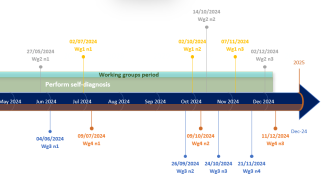How is Artois University involved in the HRS4R initiative ?
Institutional Commitment :
This charter and code were adopted by the institution during the Research Commission on June 22, 2018.
The labeling project was presented to the university's bodies for validation of our commitment by its decision-making bodies :
• Research Commission
• Board of Directors
• Establishment's Social Administration Committee
Community Engagement in Research at the University of Artois :
The first task was to diagnose the current state of the implementation of the 40 principles of the Charter and Code. To achieve this, a steering committee and four working groups have been created.
The process involves users at all stages (researchers, technicians, administrative staff, doctoral students, etc.), and a call for applications has been made to form the working groups.
The Research community will also be consulted on the prioritisation of improvement actions resulting from the self-evaluation. This work will enable the development of an action plan that will be submitted for review by the steering committee.
Commitment to Transparency :
Since the approach is gradual (6 years for the initial phase and implementation, followed by a 3-year cycle), regular updates on progress will be communicated to raise awareness among stakeholders. A generic email address has been created to centralise all contact with the HRS4R project team and to respond to questions related to the approach : hrs4r@univ-artois.fr
KEY STAGES (PROJECT TIMELINE) :
The acceptance of the letter of commitment by the European Commission marks the official entry into the process of obtaining the label.
| Stages : | Dates : |
|---|---|
|
Preparatory governance meeting |
09/05/2023 |
|
Presentation to the university bodies : • Board of Directors |
|
|
Meeting of Faculty directors |
28/11/2023 |
|
Meeting of laboratory directors |
08/11/2023 |
|
Meeting of heads of offices |
11/01/2024 |
|
Steering Committee N1 |
21/11/2023 |
| Call for applications | End of January 2024 |
|
Steering Committee N2 |
19/03/2024 |
|
Submission of the commitment letter |
03/04/2024 |
|
Response from the European Commission |
15/04/2024 |
| Streering Committee N3 | 24/01/2025 |
| Steering Committee N4 | 07/03/2025 |
| Deadline for the submission on deliverables on the Euraxess platform | 15/05/2025 |
Download the timeline planning :
Retroplaning_HRSR4_EN.pdf
COMMITMENT LETTER :
Lettre d'engagement de l'université d'Artois.pdf
MANAGEMENT OF THE INITIATIVE :
Project-based methodology: a long-term strategy
The establishment of a steering committee or working group is necessary to bring together different types of personnel and to address each thematic area.
- Step 1 : Appoint an HRS4R pilot
- Step 2 : Establish a steering committee : 2 or 3 meetings to implement the approach in the initial phase.
The Steering Commitee
Members :
• HRS4S pilot : Deputy General Manager – Director of Human Resources
• Co-pilot : political representatives (Vice-President of the Research Commission and VP of personnel policy and human relations
• Steering Committee :
- VP of the Research Commission
- VP of personnel policy
- VP of international relations
- Director-General of Services
- Director of Human Resources
- Director of Research and Doctoral Studies
- Head of the International Relations Office
- Head of the Support Service
- Quality specialist
Missions :
- Validate the strategic orientations of the approach
- Participate in the development of the internal analysis (GAP analysis + OTM-R checklist)
- Arbitrate the measures selected in the action plan
- Ensure the proper deployment of the approach and compliance with the schedule
- Oversee its implementation
- Identify and report any potential bottlenecks or difficulties in the project's deployment
During the initial phase, the steering committee met four times. For the follow-up of the action plan, it will meet at least twice a year.
Working groups : missions
The four working groups are divided according to the four main themes of the initiative mentioned above.
Commitment to the HRS4R initiative in the research field can also be valued within the HCERES framework. Each working group, composed of around ten people, is coordinated by a pilot.
In order to mobilize a panel of teacher-researchers and staff throughout all stages of the labeling process and with the relevant structures, a call for applications was organized.
Each group has the mission of examining the 40 principles of the charter and code to complete the Gap analysis (self-evaluation).
- Ethical Principles
- Professional Responsibility
- Professional Conduct
- Contractual and Legal Obligations
- Accountability
- Research Best Practices
- Dissemination and Valorization of Results
- Public Engagement
- Non-discrimination
- Evaluation Systems
- Freedom of Research
- Recruitment (Charter)
- Recruitment (Code)
- Selection (Code)
- Transparency
- Merit-based Assessment (Code)
- Variations in CV Chronological Order (Code)
- Recognition of Mobility Experience (Code)
- Recognition of Qualifications (Code)
- Seniority (Code)
- Postdoctoral Appointments (Code)
- Recognition of the Profession
- Research Environment
- Working Conditions
- Job Stability and Permanence
- Funding and Salaries
- Gender Equality
- Career Development
- Value of Mobility
- Access to Career Counseling
- Intellectual Property Rights
- Co-parenting
- Teaching
- Complaints/Appeals
- Participation in Decision-making Bodies
- Relationship with Supervisors
- Supervision and Management Roles
- Continuing Professional Development
- Access to Research and Continuing Professional Development Training
- Mentoring
Missions of the working groups :
- Deepen the analysis around the themes
- Propose actions and examine their feasibility
- Set a timetable for the implementation of actions
There were 3 to 4 meetings per working group from April 2024 to December 2024.

